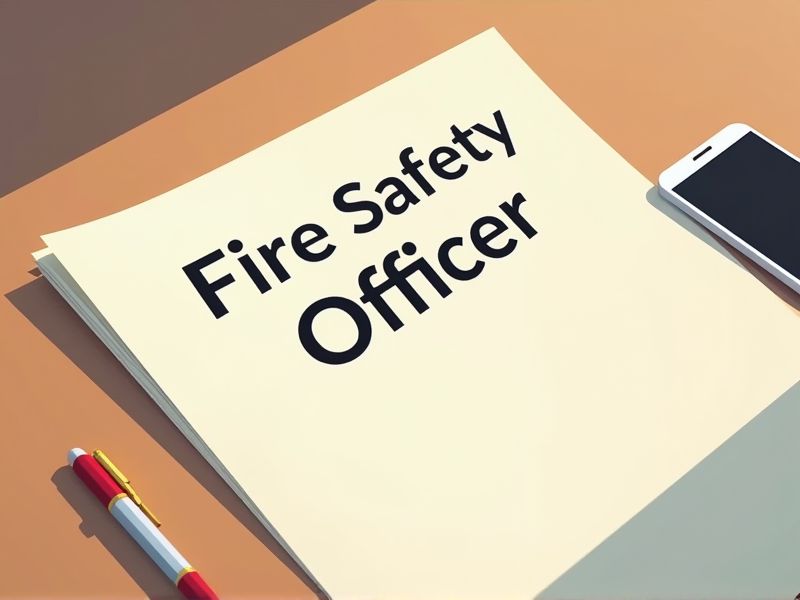
Fire Safety Officers play a crucial role in managing fire hazards and ensuring public safety in various environments. Their responsibilities often involve implementing safety protocols, conducting inspections, and providing training, which demands a comprehensive understanding of fire safety standards and practices. Certain certifications validate their expertise and ensure they are equipped to handle complex fire protection systems and emergency scenarios. Important certifications for a Fire Safety Officer include those that cover fire science, risk assessment, and emergency response strategies.
Certified Fire Protection Specialist (CFPS)
Organizations require Certified Fire Protection Specialists (CFPS) to ensure compliance with fire safety regulations and minimize the risk of fire-related incidents. By providing a standardized credential, CFPS certification enhances the credibility and expertise of fire safety officers, leading to improved safety protocols. This certification demonstrates a comprehensive understanding of fire science, which is crucial for effectively assessing and mitigating fire hazards. Having CFPS-certified professionals can reduce potential liabilities, as they are equipped to prevent costly fire damage and ensure workplace safety.
NFPA Certification (e.g., NFPA 1, NFPA 101)
NFPA Certification is crucial for Fire Safety Officers as it establishes a standardized understanding of fire safety protocols and codes. With NFPA 1 focusing on fire prevention standards, officers can ensure environments are up to code, significantly reducing fire risks. NFPA 101 emphasizes life safety measures, enabling officers to effectively assess and implement evacuation plans during emergencies. This certification equips officers with credible expertise, gaining trust and compliance from institutions and stakeholders in safety practices.
Fire Inspector Certification (Level I)
Fire Inspector Certification (Level I) equips a Fire Safety Officer with the necessary knowledge to identify potential fire hazards in buildings effectively. Certification ensures that the officer is familiar with fire safety regulations, essential for enforcing compliance and reducing the risk of fire-related incidents. Training associated with certification enhances decision-making skills, critical during fire inspections and investigations. Certification also boosts credibility, which can facilitate collaboration with other safety professionals and agencies.
OSHA 30-Hour Safety Training
The OSHA 30-Hour Safety Training provides comprehensive knowledge of regulatory standards, crucial for a Fire Safety Officer to ensure workplace compliance and safety. This training equips the officer with the ability to identify, evaluate, and mitigate potential fire hazards effectively. Enhanced understanding of safety procedures through OSHA training can lead to reduced workplace incidents and improved emergency response. Consistent with OSHA regulations, this training helps in fostering a safe working environment, benefiting both employees and employers.
Incident Command System (ICS) Certification
ICS certification is required for a Fire Safety Officer to ensure standardized and efficient management of emergency situations. This certification enables the officer to effectively coordinate with other agencies and departments during incidents. ICS training equips the officer with skills to allocate resources and personnel appropriately. The certification helps in improving communication, thereby reducing the likelihood of oversight or error in emergency response.
Emergency Management and Response Certification
Emergency Management and Response Certification equips a Fire Safety Officer with critical skills to coordinate efficiently during crises. This certification ensures that officers understand standardized procedures, reducing chaos when responding to emergencies. With this knowledge, officers can implement effective evacuation plans and safeguards that protect lives and property. Certification also enhances credibility and trust with the public and other emergency services, promoting cohesive operations during incidents.
Hazardous Materials (HazMat) Awareness Certification
Hazardous Materials (HazMat) Awareness Certification for a Fire Safety Officer enhances the ability to identify hazardous substances, which directly improves response times and decision-making in emergencies. Possessing this certification ensures compliance with safety regulations and legal standards, minimizing liability risks for departments. Knowledge of HazMat protocols aids in effectively coordinating with other agencies and emergency services, fostering a more unified response strategy. Comprehensive understanding of hazardous materials reduces the potential for on-site accidents, safeguarding both team members and the public.
Building Life Safety Certification
Building Life Safety Certification ensures that fire safety officers are proficient in evaluating a structure's adherence to safety codes, critically minimizing potential fire hazards. The certification emphasizes a standardized knowledge base, enhancing the officer's ability to implement fire prevention measures effectively. It equips officers with advanced skills for emergency response, ensuring faster and more coordinated evacuation procedures. Promoting a culture of safety, the certification drives continuous improvement in practices and regulatory compliance.
CPR/AED Certification
A CPR/AED certification empowers fire safety officers to respond promptly to cardiac emergencies, reducing the time before professional medical help arrives. This certification ensures compliance with safety regulations and increases the officer's overall effectiveness in emergency situations. Data indicates that immediate CPR can double or triple a cardiac arrest victim's chances of survival. Acquiring these skills boosts confidence and preparedness, leading to safer community environments.
Fire Marshal Certification
Fire Marshal Certification ensures a Fire Safety Officer possesses specialized knowledge in fire prevention techniques and regulations, enhancing public safety. This certification validates the officer's ability to conduct thorough inspections, reducing the risk of fire hazards. It also mandates that officers stay updated on the latest fire safety codes and advancements. Certification aids in standardizing fire safety practices across jurisdictions, promoting cohesive and effective emergency response protocols.
Summary
When you attain certifications as a Fire Safety Officer, you can anticipate an increase in your professional credibility and expertise. This specialized knowledge equips you to implement better fire prevention strategies, reducing potential risks. Obtaining such credentials may also lead to career advancement opportunities and higher earning potential. With advanced training, your ability to respond effectively during emergencies is enhanced, improving overall safety outcomes.
